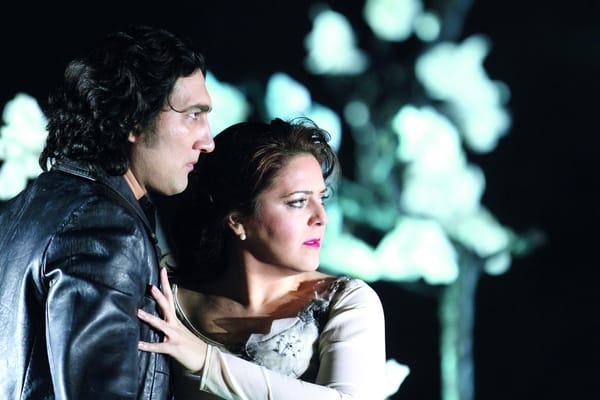Julius Caesar | A bold retelling of Shakespeare
Julius Caesar is on at the King's Cross Theatre until Saturday, the 17th of December

Just before the start of the performance, as we, the soon-to-be-audience, stand packed like sardines into the small lobby of the King’s Cross Theatre, the sirens go off. The chatter falls silent in the face of the piercing wail, followed by an uniformed prison officer pushing through the crowd – “prisoners coming through!” The cast, dressed in grey sweats and hoodies, march past into the theatre, faces set in grim defiance. The Donmar Warehouse’ Shakespeare Trilogy, made up of The Tempest, Henry IV, and Julius Caesar, marks director Phyllida Lloyd’s return to the Donmar with her all-female cast adaptation of Shakespeare. The return is triumphant; the plays feel just as revolutionary, just as exhilarating as they were four years ago when the first iteration of Julius Caesar with an all-female cast was staged at the Donmar in 2012.
The performances are plays within plays – the setting is in a women’s prison, the conceit being that the prisoners are performing Shakespeare’s works as part of an educational programme. At the beginning of the performance Jade Anouka reads aloud from a scrap of paper: “this play gave me my voice...I hope you enjoy it,” and what a voice it is – Anouka as Anthony lights up the stage from the first moment, singing a pop ballad to introduce the return of his beloved Caesar. In the background for long stretches the opening act, Anouka once again smoulders in Act III Scene II in the “friends, Romans, countrymen” speech.
Harriet Walter worked with Phyllida Lloyd on the original run of Julius Caesar in 2012, and now she returns as Brutus in Caesar, the lead in Henry IV, and Prospero in The Tempest. She lends Brutus a wiry sort of inner strength, from his reticence in the first act as Cassius implores Brutus to recognise within himself what the rest of Rome already see – his capability to be a great leader – to the rather more confident and grandiose speeches that Brutus delivers later in the play. Walter’s stage experience and classical training show in her subtle performance. Her scenes particularly with Claire Dunne as Portia are exquisite to watch. In understated gestures both Walter and Dunne portray immense tenderness. In another extraordinary scene, Brutus dances a slow waltz with the ghost of Caesar as Lucius plays an haunting melody; at the corners of the stage other cast members stand with slowly rotating disco balls so tiny sequins of light glide over Brutus and the ghost. It is an inexplicable, beautiful rendering of the ways that Brutus, having committed an act of violence and betrayal, is now forever linked to Caesar. Another stand out performer is Martina Laird as Cassius, a role which she grows into, particularly hitting it out of the park in Act IV Scene III, in which Cassius and Brutus find that all their problems have not been solved by killing Caesar. Laird’s performance, like that of her cast mates, is unique in melding her own dialect and cadences to the 400 year old words. The women’s prison setting raises the question: who does Shakespeare belong to? These plays are so often relegated to English GCSE lessons, drilled into children who might never see the plays performed as they should be, or the plays are performed in select enclaves in stuffy costuming, amidst stuffy surroundings, wearing the history and heritage behind each word wearily. How refreshing then to see it affirmed that these stories, these words, are universal. Lloyd’s production is not only all-female, but seems to have employed blind casting in terms of racial diversity as well: the cast is populated with women of different ethnicities and backgrounds, and the performance is richer for it.
Julius Caesar is a story of the dangers of ambition. In some parts it’s hard not to draw parallels between Jackie Clune’s swaggering, callous Caesar and Donald Trump. Yet the play at its core is not a reflection of the current political climate but an exploration of how society treats powerful women, or women who crave power. Caesar is of course struck down for being too ambitious. Octavius too is thwarted – when towards the end, Octavius begins to revel in his victory the play within the play is abruptly shut down. Prison guards enter the stage and haul off the women performing. “That’s not how it ends!” cries Harriet Walter plaintively, the guards haul her off all the same.
Julius Caesar is a play of rebellion and power struggles, yet the powerlessness of the imprisoned women is made clear – the stage is mocked up as basketball court outside the prison; the audience watch from the bleachers – seats arranged on scaffolding like structures looking down into the pit of the stage. Monitor screens blink video footage high up on the walls around the stage, and the occasional patrolling guards can be seen, while huge caged walkways border the edges of the room. The staging is squalid, and at times claustrophobic, mirroring the disenfranchisement of the inmates; yet it crackles with the energy the cast produces. This is a performance to be experienced, not talked about, from the bone shaking vibrations of the drums that are played onstage to signify battle, to the rattling of the bars, to the explosive performances, it is all immersive. I emerged from the theatre a little shell shocked, wanting to watch it all over again. This is not to be missed.









